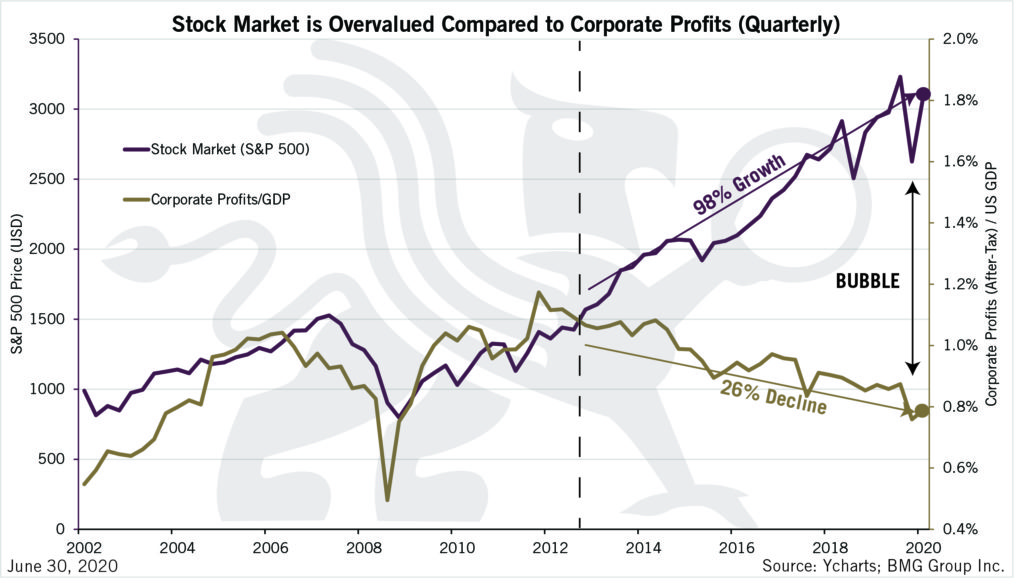By Nick Barisheff
Special to the Financial Independence Hub
Global stock markets suffered the worst first quarter in their history in 2020, as the COVID-19 pandemic rattled markets. After slowing 5% in the first three months of 2020, the U.S. economy shrank by a whopping 33% in the second quarter. If you think these numbers are bad, it is only going to get worse. The second wave of the pandemic is forcing governments around the world to renew lockdown measures that will push the U.S. economy, and most western economies, to the brink.
Chaotic elections, a battered economy
This is all happening at a time when the U.S. just conducted the most chaotic presidential election in its history in November. Rioting and civil insurrection are occurring in U.S. cities, and crime is accelerating. Lawsuits over mail-in ballots have already started across the country. What’s more, the nomination of Amy Coney Barrett as successor to Ruth Bader Ginsburg promises to be hotly contested, as the choice of nominee will have huge implications following the election. If the election result is disputed [as it was within days of the November 3rd vote: editor] the U.S. Supreme Court may end up deciding whether Trump or Biden will be president for the next four years.
If the global pandemic, civil unrest in many U.S. cities, war looming in Armenia, thus pulling Russia, NATO and the European Union into a conflict were not enough, the U.S. economy, as well as most western economies — including Canada’s – are going to get a whole lot worse.
Overvalued markets, declining corporate profits
U.S. equity markets and corporate profits were already on a divergent path well before COVID-19 hit, and this trend will only continue – especially if the second wave forces more closures and lockdowns in the fall and winter. Restaurants, hotels, travel and tourism, airlines, and small businesses across the country are barely hanging on. Bankruptcies are set to skyrocket.
Coming defaults in the real estate sector
One of the biggest economic issues — one that hasn’t received a lot of attention — is the wave of defaults that will hit all areas of the real estate sector. Financial districts of major cities are ghost towns. It’s just a matter of time before large tenants terminate or default on their leases. Developers are stuck in a rut, as demand has collapsed.
Mortgage defaults and collapsing real estate markets will in turn lead to problems in the banking sector. In fact, mortgage delinquency rates in the U.S. climbed to 8.2% at the end of June – the highest level since 2011. More than 8% of all U.S. mortgages were past due or in foreclosure.

To keep the economy from collapsing, the U.S. Federal Reserve and other western central banks are going to have to print even more money, which will only exacerbate the bubbles in the financial markets and margin debt levels. What’s most worrisome is that all these factors — declining markets, a shrinking economy, and the second wave of the pandemic — are morphing together just as the U.S. is about to face one of the most chaotic presidential elections in history.
How should investors proceed?
What are investors to do? If you listen to the media or those in the industry, the mantra is to stay invested for the long term. That strategy works well during long bull markets. However, this strategy doesn’t make sense when you’re standing on the edge of a precipice — which we are today.
The market is poised to fall much further, so it does not make sense to stay invested in financial assets and suffer additional losses. In fact, if a portfolio declines by 50%, it would have to increase by 100% just to break even. Market history is full of examples of this.
For self-directed investors using discount brokerage accounts, a better strategy would be switching to Class D units of BMG Mutual Funds. The best place to be invested while awaiting the market crash is gold bullion, because gold has a low correlation to other asset classes and has historically appreciated during broad market corrections. In fact, gold has risen dramatically this year, and will continue to do so while other asset classes continue to decline.
An investment strategy for today’s markets
For accredited investors and institutions, an even better strategy would be switching to gold, experiencing significant gains, and then redeploying those gains to a diversified portfolio of stocks, bonds, REITs, gold and silver when the market has finished correcting. This is exactly what the BMG Diversified Hedge Fund is designed to do.
A properly structured and timed transition into the best-performing funds across four asset classes – equities, fixed income, real estate, and gold and silver bullion – will significantly improve yields and capital appreciation while maintaining low levels of volatility, when there is a broad and sustained market recovery.
At BMG, we back-tested this strategy with our BMG Diversified Hedge Fund and found that implementing it during the 2008 financial crisis would have resulted in annual gains of 22% for 12 years afterwards. Plus, investors would have received over $45,000 in dividends over this period on an initial $25,000 investment.
Now is not the time to stay invested. Many baby boomers will simply not live long enough to break even. Instead of moving to cash, consider that gold can provide your portfolio investment gains, true diversification away from stock and bond markets, and a hedge against the coming market crash. The chaos in the economy and the U.S. presidential election means the price of gold will continue to increase dramatically in the foreseeable future.
 This article was written for Taxes and Wealth Management Issue13-3, a newsletter published by Taxnet Pro.
This article was written for Taxes and Wealth Management Issue13-3, a newsletter published by Taxnet Pro.
Nick Barisheff is the founder, president and CEO of BMG Group Inc., a company dedicated to providing investors with a secure, cost-effective, transparent way to purchase and hold physical bullion. BMG is an Associate Member of the London Bullion Market Association (LBMA) as well signatory to the Six Principles of Responsible Investments (United Nations endorsed Principles for Responsible Investment – PRI).
Widely recognized as international bullion expert, Nick has written numerous articles on bullion and current market trends that have been published on various news and business websites. Nick has appeared on BNN, CBC, CNBC and Sun Media, and has been interviewed for countless articles by leading business publications across North America, Europe and Asia. His first book, $10,000 Gold: Why Gold’s Inevitable Rise Is the Investor’s Safe Haven, was published in the spring of 2013. Every investor who seeks the safety of sound money will benefit from Nick’s insights into the portfolio-preserving power of gold. www.bmg-group.com






